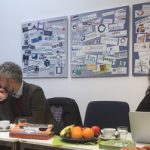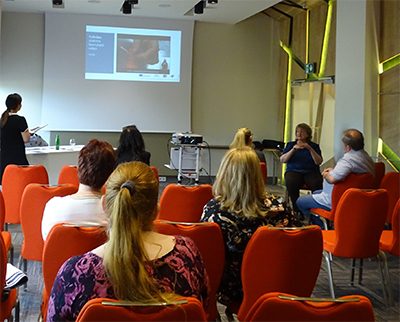Ágnes Szigetvári, the vocational director of our foundation hold a presentation to the doctors
Would you like to read more interesting articles about our foundation, our vocational director and about our experience on the employability of the hearing impaired, click on the presentation in the end of this article.
Ágnes Szigetvári, the vocational director of our foundation hold a presentation to the doctors who examine the patients with disabilities during the rehabilitation verification check in the frame of the course organised by the Semmelweis Medical University. The event was held in the building of the National Healthcare Fund.
During the lecture, the vocational director highlighted some vulgar errors, such as the rehabilitation of the hearing impaired means wearing better and better hearing aids. As she indicated, even the hearing impaired employees know that it is difficult to understood their speech, their vocabulary is poorer than a hearing colleague’s, and they often understand badly or misunderstand their tasks. The consequence of them can be increased working stress and frustration, psychical and somatic diseases, etc.
Ágnes Szigetvári explained that in order to handle these situations, psychologists and employability mentors, audio mentors and working assistants should work with the hearing impaired at school and in the workplace. Domestic and international experiences show that without hem, the integration is not often successful.
In order to manage the above mentioned issues, an information and rehabilitation centre should be needed. She added that according to our experience, the restored rehabilitational and employability-related central agencies show an increasing tendency on their vocational knowledge and empathy while doing their job, and as a foundation working for the hearing impaired, we would like to express how pleased we are.
She expressed as a good piece of news that the employability of the people with changed working abilities are showing a great development in the last few decades. According to the information coming from the hearing impaired society and our foundation, the hearing impaired people more-or-less know about the employers employing people with changed working abilities. Most of them are productive units of bigger companies, where the employers usually don’t remain for a longer period. The reason is that in these workplaces the hearing impaired don’t often receive that kind of mentoring support which should be necessary in order that their work should reach the level of a hearing colleague’s work.
The situation is different in small companies, where the key point of the real integration is the mutual development and acceptance, she added. At these employers, the colleagues from the mayor society are more open-minded for the acceptance and the employability of the hearing impaired colleagues.
In fact, it is less positive that from a vocational and HR political viewpoint these small companies are less awared, since there are no methodology materials available, the share of the ood practices are missing, they don’t ask for working assistance from the rehabilitation authorities.






